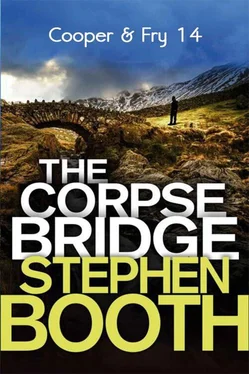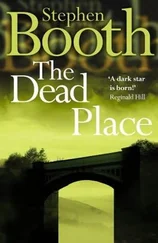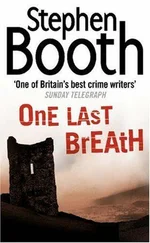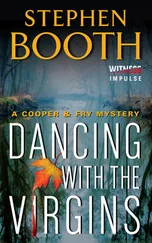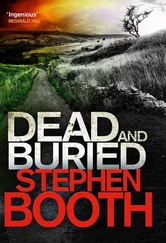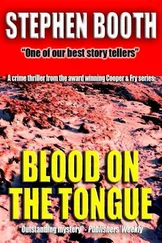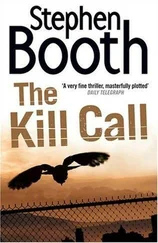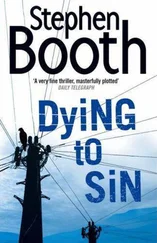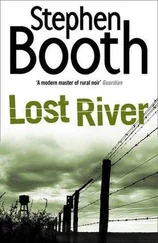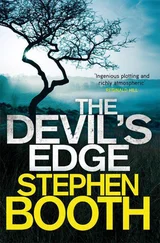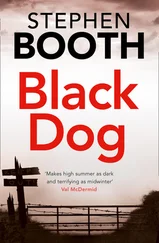Stephen Booth - The Corpse Bridge
Здесь есть возможность читать онлайн «Stephen Booth - The Corpse Bridge» весь текст электронной книги совершенно бесплатно (целиком полную версию без сокращений). В некоторых случаях можно слушать аудио, скачать через торрент в формате fb2 и присутствует краткое содержание. Год выпуска: 2014, Издательство: Little, Brown Book Group, Жанр: Полицейский детектив, на английском языке. Описание произведения, (предисловие) а так же отзывы посетителей доступны на портале библиотеки ЛибКат.
- Название:The Corpse Bridge
- Автор:
- Издательство:Little, Brown Book Group
- Жанр:
- Год:2014
- ISBN:нет данных
- Рейтинг книги:3 / 5. Голосов: 1
-
Избранное:Добавить в избранное
- Отзывы:
-
Ваша оценка:
- 60
- 1
- 2
- 3
- 4
- 5
The Corpse Bridge: краткое содержание, описание и аннотация
Предлагаем к чтению аннотацию, описание, краткое содержание или предисловие (зависит от того, что написал сам автор книги «The Corpse Bridge»). Если вы не нашли необходимую информацию о книге — напишите в комментариях, мы постараемся отыскать её.
The Corpse Bridge — читать онлайн бесплатно полную книгу (весь текст) целиком
Ниже представлен текст книги, разбитый по страницам. Система сохранения места последней прочитанной страницы, позволяет с удобством читать онлайн бесплатно книгу «The Corpse Bridge», без необходимости каждый раз заново искать на чём Вы остановились. Поставьте закладку, и сможете в любой момент перейти на страницу, на которой закончили чтение.
Интервал:
Закладка:
Cooper sat on a bench for a while, enjoying the quiet and the chance to think. It wasn’t the Sandra Blair inquiry that was bothering him. The solution to that would surely turn out to be something perfectly ordinary and sordid. Almost predictable, in fact.
It wasn’t even Dorothy Shelley he was worried about. He’d phoned the hospital earlier in the evening to check on her condition and had been told she was ‘comfortable’. He knew from experience that it was what they said when there was no hope of recovery. But her family were at her side and it wasn’t his place to intrude. There was nothing more he could do.
No, it was Diane Fry’s behaviour that baffled him. He’d tried to make friends with her when she’d first come to Derbyshire, but he’d failed. He’d tried to understand her, hoping she would relax a little and open up. But in the past she’d hardly noticed his attempts at empathy. She’d simply passed him by, as if he were no more than a piece of furniture. But then, she behaved the same way with everyone else, didn’t she?
Yes, Fry’s lack of empathy was legendary. He’d been reminded of it by one moment during Liz’s funeral. In fact, he’d seen it at almost every funeral he’d ever been to. If you looked behind the church or crematorium, you’d sometimes see the drivers of the hearse and the funeral cars laughing and smoking among themselves during the service.
Well, the undertakers didn’t really care that your fiancée had died. They attended two or three funerals every day and they couldn’t be prostrated by grief every time, especially for people they didn’t know. But for a while Cooper found it hard to understand how people could do the job at all. How did you spend time with a crowd of people who were grief stricken and not share their emotions? How could you go to funeral after funeral, every day of the week, all the year round, and not be affected by it? It needed a particular type of person to spend their life dealing with death, thinking about death, and meeting those who’d just been bereaved, and yet be able to chat and joke with their friends as if they didn’t have a care in the world.
After Liz’s funeral he’d come away with the conviction that people who did the job must be sociopaths. Only a serious personality disorder would enable you to look so solemn while you carried a coffin, then take off your tie, go home and eat dinner, watch the TV, and tell the wife you’d had a good day at work.
In fact, he’d envied those people. For a long time, he wished he could be like them. But he knew he would fail.
That idea, though, had made him look at Diane Fry differently. If it was true about funeral directors, then what about a police officer? Someone who dealt with nothing but murder cases and rapes, and serious violent crimes? Were they also sociopaths who just happened to have found themselves a profession where their personality disorder was an advantage? No one wanted a cop who empathised too much. It made them less professional, not so good at their jobs.
Cooper shivered with cold and knew it was time to go home. He stood up suddenly, startling the ducks and making them rattle their wings in the darkness.
No, he had never been able to achieve that level of detachment himself. No amount of trying got him to a position where he could create that protective façade. He’d become convinced this was what might prevent him from moving up the promotion ladder in the police service. It was the Diane Frys they wanted these days.
But then he recalled the new version of Diane he’d encountered in her flat on Friday night. The softer, more relaxed Fry. The one who actually asked him for a favour. Was this the same person? Could it be the woman he’d always suspected might exist behind the brittle exterior?
If so, this new Diane Fry was like a glimpse of some illusory oasis, glittering in the distance but defying the most determined traveller to reach it. The nearer he got, the further away she would seem. It felt inevitable, the story of his life. It was certainly the story of his relationship with Fry.
The ducks quacked quietly in agreement as he walked away from the peace of the river and headed back towards the town.
While Ben Cooper sat by the riverside in Edendale, Luke Irvine was in the pub. His date hadn’t gone too well the night before. No matter how often he checked his phone, there were no text messages. So he couldn’t imagine she was expecting to hear from him again tonight. But that seemed to be the story of his life at the moment. Opportunities came along, but were allowed to escape.
As he watched the other customers in the bar of the Angler’s Rest, Irvine knew that Ben Cooper would still be out asking questions about the woman whose body had been found at Hollins Bridge. Overtime meant nothing to his DS. Though he admired Cooper in lots of ways, Irvine hoped he never ended up like that himself. Dedication to the job was great, but it was so much better to have a life away from the office.
Irvine lived in the village of Bamford, between the Hope Valley and the Upper Derwent. It was a short drive over the hill to Edendale, but quiet enough to give him the village life he’d grown up with in West Yorkshire.
A man he knew vaguely from a few houses down the road came and sat down on a vacant seat nearby. He nodded and said, ‘Hi’. Irvine acknowledged him cautiously. Conversations in the pub could be difficult, he’d discovered.
‘Good to see the place so busy,’ said the man.
‘Yeah, great.’
‘It just goes to show.’
‘You’re right, it does.’
Irvine took a swig of his beer, holding the bottle to his mouth a bit longer than was strictly necessary. He knew what the man was talking about, without any telling.
People in his community had spent months raising the money to buy their village pub. They formed a cooperative society to take ownership of the building, with hundreds of residents buying shares. They successfully applied to get the pub registered as an ‘asset of community value’ under the government’s new Localism Act. They drew up a business plan, outlining a scheme for a community hub with a café and shop, and accommodation for visitors. Their village post office was due to close too and they negotiated to move counter services into the pub. They appeared in the local media, manned stalls at shows and fêtes, and enough money came in to make the dream possible.
For a while it had all seemed to be going well. With the financial targets hit, solicitors were instructed to begin the conveyancing process. But on the same day the company that owned the pub announced it was exchanging contracts with a third party — a developer who would make the deal pay by building houses on the car park.
Irvine remembered calling into the pub one night for a drink when the news had just broken. The mood was disturbing. Everyone he spoke to was frustrated and angry, convinced they had been betrayed by big business and exploited for a quick profit.
One of his neighbours, who’d had a couple of drinks too many, buttonholed him at the bar while he was ordering a bottle of Thornbridge Sour Brown. Like a doctor, Irvine found he could never escape the fact that he was a police officer, even when he was off duty. In fact, it had been worse since he joined CID and became a detective. Everyone wanted to hear gory details of cases, tell him their theories, or ask him for clandestine forms of assistance that would undoubtedly lose him his job.
That night, though, there was only one topic of conversation. The last-minute betrayal over the sale of the pub had turned people’s minds to committing crime rather than solving it.
‘This could definitely be a motive for murder,’ this same neighbour had said, leaning close to him at the bar. ‘With a hundred and eighty-five potential suspects at the last count. They might all commit the crime together, like the plot of an Agatha Christie story.’
Читать дальшеИнтервал:
Закладка:
Похожие книги на «The Corpse Bridge»
Представляем Вашему вниманию похожие книги на «The Corpse Bridge» списком для выбора. Мы отобрали схожую по названию и смыслу литературу в надежде предоставить читателям больше вариантов отыскать новые, интересные, ещё непрочитанные произведения.
Обсуждение, отзывы о книге «The Corpse Bridge» и просто собственные мнения читателей. Оставьте ваши комментарии, напишите, что Вы думаете о произведении, его смысле или главных героях. Укажите что конкретно понравилось, а что нет, и почему Вы так считаете.
